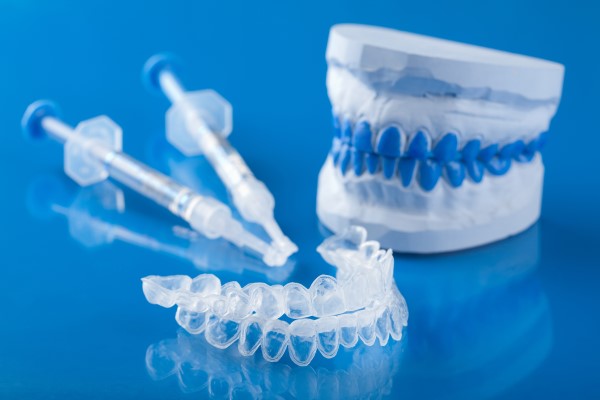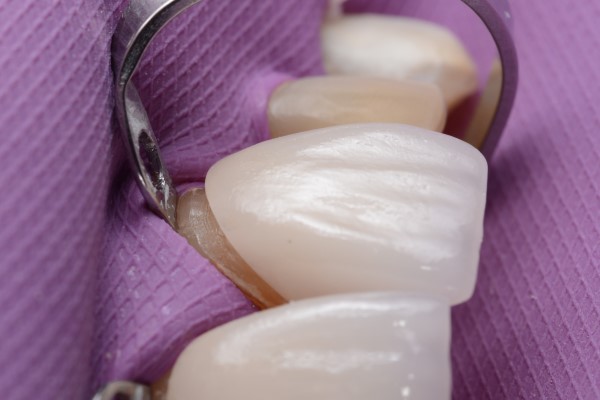Professional Teeth Whitening Commonly Asked Questions

Teeth whitening treatments provide a non-invasive way to significantly improve the color of your teeth. For many patients, a single whitening session is enough to restore the whiteness of their teeth. Patients with severely stained or discolored teeth might need follow-up treatments to reach an ideal shade of white.
Dentists typically use the white of a patient’s eyes as the ideal shade of white to target for their teeth. Whitening a person’s teeth more than a few shades whiter than their eyes often leads to unnatural-looking results.
Frequently asked questions about teeth whitening treatments
Considering improving the way your smile looks with teeth whitening treatments? Here are the answers to some of the questions you might have:
1. What is the difference between professional whitening treatments and whitening teeth with over-the-counter treatments?
The main difference between these two approaches to whitening teeth is the concentration levels of the bleaching agents being used. Professional whitening treatments are done with highly concentrated bleaching products that can only be used under the supervision of a dentist. These products are not sold to the general public. Even the at-home whitening kits provided by dentists contain more concentrated bleaching agents than OTC products. Also, products used by dentists are made to a higher standard so they are less likely to contain abrasive agents that can end up damaging teeth.
2. How long do whitening treatments last?
Conventional professional whitening treatments last anywhere between 60 to 90 minutes. The latter is the maximum time considered safe to leave teeth exposed to bleaching agents. Dentists can shorten treatment times by using a laser to speed up the reaction between the bleaching agents and the patient’s teeth. The laser can cut the time spend whitening teeth down to as little as 45 minutes.
3. How effective are professional teeth whitening treatments?
Nothing compares to professional teeth whitening thanks to the concentrated bleaching products used. A single treatment can improve the color of a person’s teeth by up to 8 shades according to the American Academy for Cosmetic Dentistry. At-home whitening kits provided by dentists take longer to whiten teeth, but they can provide results comparable to in-office treatments when used daily for about two weeks.
4. Do whitening treatments work on all types of stains and discoloration?
Teeth whitening treatments effectively remove most types of stains and discoloration, but they do not get rid of all types of stains. Whitening treatments work well on stains caused by the things a person eats, stains caused by smoking, and the yellow discoloration that affects teeth as a person ages.
It is not an effective way to get rid of stains caused by tooth decay, fluorosis, or tetracycline antibiotics. These types of stains can be covered up with composite bonding or restorations like veneers or crowns.
We can whiten your teeth?
Ready for a brighter smile you will be happy to display? Call or stop by our Houston clinic to set up an appointment with our dentist.
Request an appointment here: https://www.houstonpersonaldentist.com or call Jeff Tollett, DDS at 7134813045 for an appointment in our Houston office.
Check out what others are saying about our dental services on Yelp: Teeth Whitening in Houston, TX.
Recent Posts
Teeth whitening is a cosmetic procedure offered by most general dentists. It targets and removes tough stains on teeth, brightening the patient’s smile. It is important to properly prepare and have realistic expectations before beginning teeth whitening treatment to ensure a successful treatment process. The teeth whitening treatment process involves a consultation visit with a licensed…
Has your dentist talked to you about getting veneers? This is one of a few options your dentist can consider to restore your smile. If you are not happy with the way your teeth look, you do not have to continue to feel embarrassed. Talk to your dentist about whether a veneer is the right…
Are you thinking about making an appointment with a laser dentist? This recent form of dentistry is becoming more common in both preventive and restorative care. It is helpful to learn more about what this professional can do and how visiting one can benefit your oral health and smile. In laser dentistry, the dentist can…
Choosing dental implants is a great idea if you are looking into your tooth-replacement options because you are missing one or more of your teeth. This option is one that offers benefits that other replacement options do not, which is why so many patients are choosing implants to replace their missing teeth. Other replacement options…


